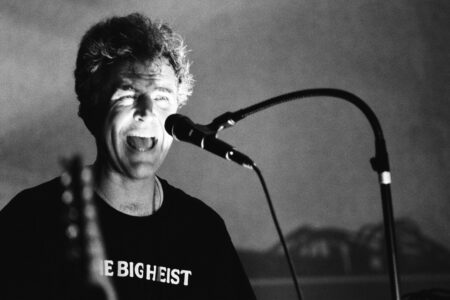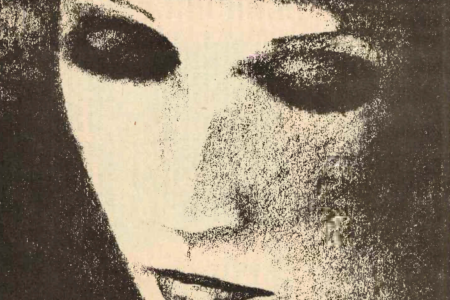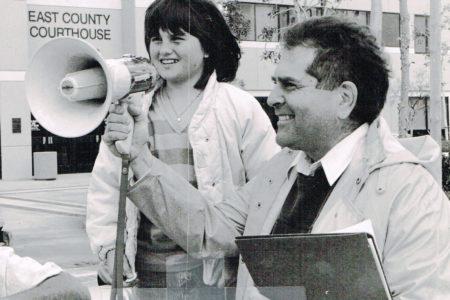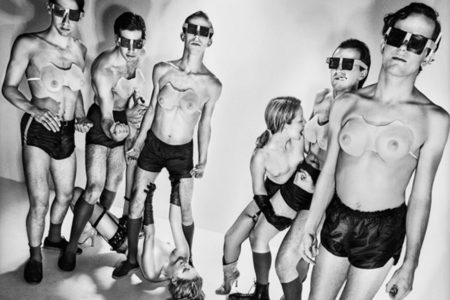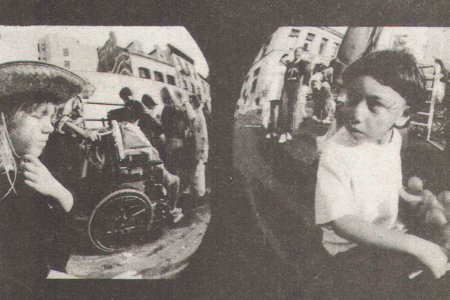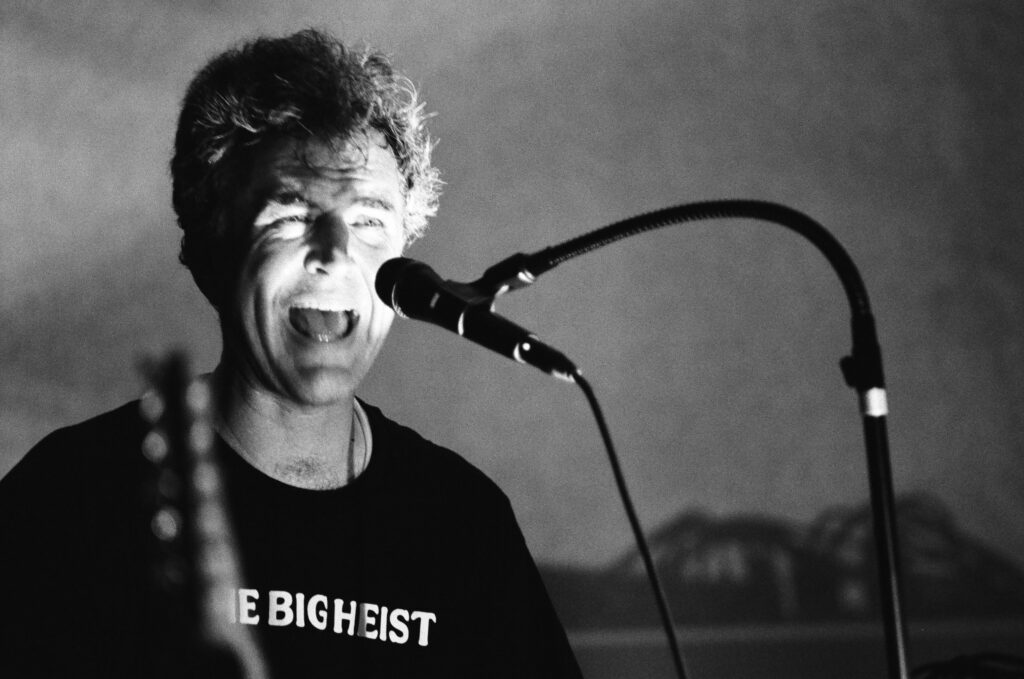
Fifteen years ago, a New England-based singer songwriter named Matt Farley was scrolling through the yearly stats for his iTunes discography and made a discovery. Of all the dozens of tracks he had uploaded, most earned zero dollars, but one — a novelty song called “My Goldfish Is Dead” — had grossed two dollars. For most creatives, these numbers would be discouraging, but Farley had an epiphany: if one novelty song could make two dollars, then perhaps 20,000 novelty songs could make $40,000?
Farley has written and performed, by his count, 24,000 songs, from which he now earns a yearly income comfortably above that $40,000 target. I don’t believe he’s cracked six digits yet, but a few weeks away from turning 45, he generates enough to afford a house and family in the Boston suburbs. He has built songs around the sorts of search terms that people shout to Siri when they’re bored: names, cities, foods, animals, the names of celebrities, sports teams and any other topic you can think of. His most popular track is “The Poop Song,” which has reached over 5.7 million plays on Spotify, and is one of an enormous body of songs he has written about elimination.
Farley’s unique business model has earned him short magazine profiles, a 2017 appearance on The Tonight Show Starring Jimmy Fallon, where he sang “Used to Be a Pizza Hut” (about repurposed former Pizza Hut locations that still retain the restaurant chain’s distinctive shape). Billie Eilish posted a TikTok of herself listening to “The Poop Song,” while Kris and Kylie Jenner posted themselves dancing to “Kris Jenner, You Are a Famous Wonderful Woman.” He still makes personal music when time allows, much of it quite good, but to polite society his reputation is that of a “Spotify spammer.”
I believe that Matt Farley is a great artist. I admire his work, and I also admire what he represents. I predict that he will one day be recognized as one of the emblematic creatives of his era. For this reason, I travelled to Peabody, Massachusetts on May 20, 2023 for the Motern Extravaganza, an annual concert and fan event Farley holds in his own honour (“Motern Media” is the name of his ad hoc production company). Farley screened two new feature films he has made and held a five-hour concert, with songs spanning his 20+ year discography. When the event was first held in 2017, it attracted 15 paying ticket-buyers, plus kindhearted friends and family. This year, over 100 convened at the Peabody Marriott, about a half-hour drive from Boston’s Logan Airport and a 10-minute drive from Farley’s home in Danvers.
Farley will lose hundreds of dollars on this event, as he does every year, but every year he loses slightly less.
When I arrive early at the Marriott’s conference hall, Farley is rehearsing with his bandmates. There is Doug “Froggy” Brennan (a childhood friend of Farley’s) on drums, Chris “Pete” Peterson (brother-in-law) on bass, and Tom Scalzo (college friend and prolific collaborator) on guitar. For over 20 years, Farley and Scalzo have periodically recorded together as a two-man band called Moes Haven, whose summative achievement was recording a new 30-minute album every day for an entire college year. It was with this experiment that Farley established one of the guiding principles of his art, which is that the finished result, however good or bad, is less important than the act of ceaseless creation.
Farley is the ringleader, and one suspects they’ll be meeting up in various configurations for creative projects for as long as he has air in his lungs. So great is Farley’s creative fervor that Peterson has shown up even though he broke his shoulder two weeks ago, wearing a sling when he’s not holding a bass. There is some suspense about whether he’ll survive a five-hour concert.
I’m here with my friend Justin Decloux, with whom I co-wrote a book called Motern on Motern in 2020. The book focused on Farley’s filmography, and involved us interviewing him and his filmmaking partner, Charlie Roxburgh, for many hours over Zoom. It was a way to pass the time during lockdown and also to distract from the day-job I hated. I always admired how they made 11 entire feature films before finding even a tiny audience. I thought it would be a satisfying anti-capitalist gesture to write a book for the same-sized audience (as it happens, the book has sold reasonably well). A creative ecosystem has emerged around Farley, inspiring me and many other people to do little projects.
I came to Farley through his movies, which I sincerely think are among the most interesting being made anywhere right now. Don’t Let the Riverbeast Get You! (2012) is a smart, funny, horror spoof made with non-actor friends and family. A horror spoof that emphasizes loquacious dialogue and odd character detail, it revels in the stiltedness of its all-volunteer cast without feeling condescending. It has an irresistible sense of communal warmth, like the best summer barbecue you’ve ever been to, and if the movie industry is mostly a playground for the rich and well-connected, these movies suggest a path to democratization.
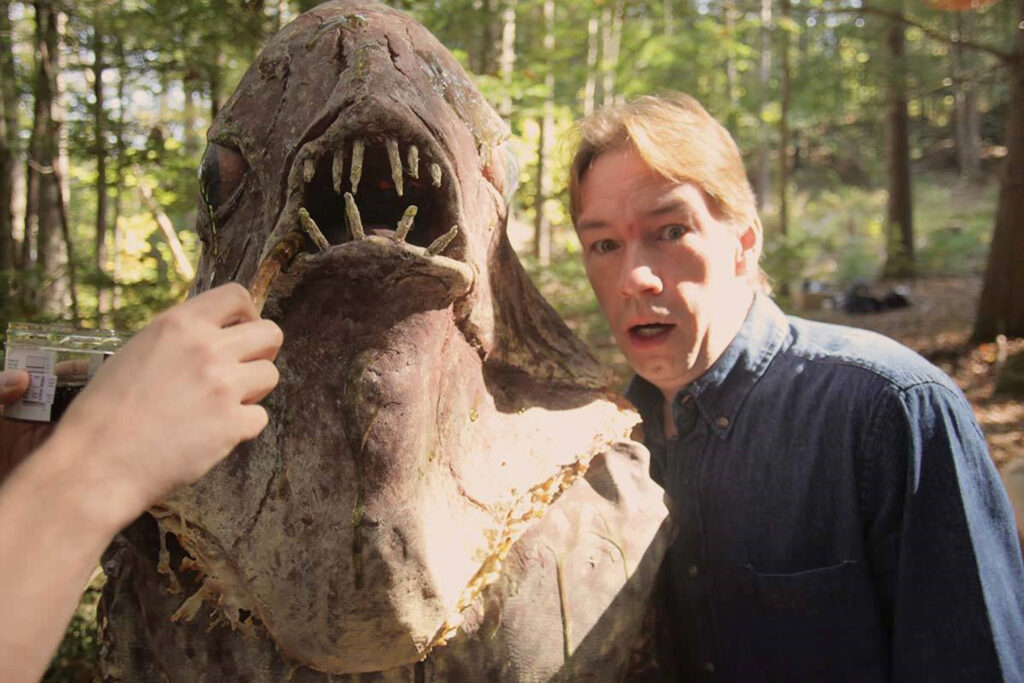
In 2021’s Heard She Got Married, Farley starred as Mitch Owens, a once-promising singer songwriter who has returned home from “the big city” with the stench of failure. All the people he once played music with have settled into lives of quiet domesticity, but he has found a new collaborator in his mailman — an aspiring bassist who may be a sublimated manifestation, à la Tyler Durden. Not quite a comedy, drama or thriller, this is one of the best movies ever made about being an artist, because of its nuanced understanding of the vast grey area between success and failure. This is an underexplored topic in cinema because most movies that we see are by people who are successful.
At 2PM we gather for the first movie screening: Heard She Got Murdered, a sequel in which Farley’s character goes on a killing spree. Afterwards, I slip out to grab a drink at the hotel bar, and find myself in line behind one of the regular Farley-players. “Oh, sorry you had to see that,” he says. I’m reminded of something I read once about how hard it is to be a prophet in your homeland.
At 4 PM, we gather again for the second movie, Boston Johnny. Here Farley stars as a sociopathic TV pitchman who speaks in a bizarre accent that can only be compared to Austin Powers in Goldmember. Inspired by such purposefully abrasive cult comedies as Freddy Got Fingered and Clifford, the movie is a hilarious patience-tester. Any double feature is a lot, but this one especially. Nevertheless, the concert begins promptly at 6PM. For five hours, Farley and his band alternate between novelty songs and more personal music (“no joke songs,” as he calls them).
While the band plays, Farley’s fans — mostly millennials and younger — mill about, taking selfies with members of Farley’s inner circle. There is Elizabeth Peterson, Farley’s wife and on-screen leading lady, with their two young children. Farley’s father, Jim, is dressed in full costume as Ito Hootkins, the monster hunter he played in Riverbeast. Another regular cast member, Bryan Fortin, has a merch table where I buy DVD-Rs of the camcorder horror movies he made in the 80s. For 30 years, Fortin has hosted a local public-access horror show called Zones of Evil, and was a god to Farley for years before they met. Charlie puts on the surprisingly meticulous foam-rubber Riverbeast monster costume and we all line up to dance with the creature.
In February, Farley went semi-viral on Twitter when he posted a screenshot from a hit piece in a middle school newspaper. “He is a slave to money,” wrote one Spencer Garrison, Grade 8. “Even when he wants to stop singing songs that are nothing more than the lowest common denominator of music, he is unable to.” Farley got a kick out of this (“It’s pretty well written! The kid has promise!” he wrote). Today, midway through an early song, he shouts out the young Garrison, who waves sheepishly from the back of the hall. The kid is greeted with applause, and I spot Elizabeth Peterson telling him how much they enjoyed the article. Farley is insecure enough to be constantly name-searching, but also self-assured enough to relish the bad reviews.
Around 7 PM, a tremor hit the room: Kevin McGee has arrived.
For 17 years, McGee was Farley’s supervisor at a group home for underprivileged teenagers. Like everyone who enters Farley’s orbit, he was recruited to act in his movies. Farley left in 2017 when his songwriting finally began to pay the bills, but McGee has remained a treasured member of the rep company. Impressively muscular for a man in his early sixties, he is the most physically imposing Motern player. With his terse, deadpan acting style, also the most natural and charismatic on camera. He is typically called upon to play villains and authority figures.
Most days of his life, McGee is a guy from New Hampshire, but in this room, he is a god. Attendees line up to get a selfie. One attendee shows off a McGee tattoo, which has him speechless. I introduce myself as being from Toronto, to which he says “I know Matt has a big Canadian following. I think some guys from Toronto wrote a book about him?” I tell him that one of those guys was me, and he looks thoroughly nonplussed.
At 9:30 PM, Farley begins what he calls the “after-hours portion.” We are three-and-a-half hours into the five-hour concert, and only Farley’s energy is undiminished. The crowd of 130 dwindles to about 35, which, as Farley points out, is still more than double the peak attendance of the first Extravaganza. He asks Chris Peterson how he’s doing, and Peterson replies, “I think my forearms’ turning purple.” Making it to 11 PM is a matter of principle.
“We have 70 minutes to fill up… somebody say a name!” Farley asks the crowd. Names are volunteered. Farley sings with passion: “Katie Katie Katie Katie Katie Kaaatie POOP! Katie Katie Katie Katie Kaaatie POOP!”
On the morning of May 21st, Farley is holding court on the shore of Hampton Beach, New Hampshire — a busy tourist spot full of pleasingly tacky souvenir shops, pizza parlors and arcades. 15 people made it to Farley’s annual morning-after beach blast.
Much is happening in Farley’s world. One of his many music personae, “The Guy Who Sings Songs About Cities and Towns,” has received a sudden spate of media attention. Farley estimates that the surge in streams will add as much as $4,000 to his yearly income. The economics of streaming are not always this advantageous. When one of his songs is sampled in a TikTok video, he earns a flat rate of three cents, which stays fixed whether the video receives millions of views, as Kris Jenner and Billie Eilish’s had.
At Hampton Beach, I met an aspiring filmmaker who recently quit his job as a publicist and made his first microbudget feature. We agreed that Farley reminded us of Hong Sang-soo, the prolific South Korean director whose individual films are less important than the threads between them. I also met Ed & Leah Mckelvey, who made an hour long movie called Ernie and Ace’s Wild Ventura (2016), which imagines the son of Ernest P. Worrell befriending Ace Ventura. All of us feel some kinship with what Farley is doing.
Will Sloan is a Toronto-based writer. He has two – count ’em – two podcasts, The Important Cinema Club and Michael & Us. You can follow him @WillSloanEsq.

